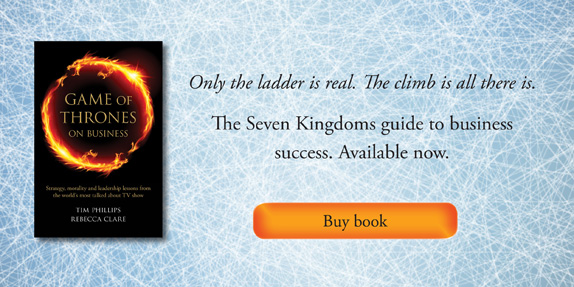What can Tesco learn from Daenerys Targaryen?
27 March 2015 by Catherine Holdsworth in Business and finance, Entertainment, Game of Thrones on Business
It was announced at the end of last year that Tesco would be closing several stores to make up for the deficit of billions of pounds lost in 2014. Whether this is a strategic retreat or an unplanned but necessary downsizing is yet to be seen. But perhaps we can hold off panic buying their ‘Finest’ range just yet, especially if the company is willing to take a few lessons from an unexpected source.
With the rise in the UK of the ‘Big Four’ supermarkets, we seem to be getting ever closer to a bust after the great supermarket boom. Competition is healthy, but how many supermarkets do we really need? There’s only so much room in our cupboards for baked beans and marmite so is there really any need for a Sainsbury’s next to a Tesco Express just down the road from Morrisons? Do the supermarkets know something that we don’t? Is the zombie apocalypse approaching quicker than expected and is their sole purpose to provide enough supplies for us to ride it out?
So perhaps this strategy of retreat from Tesco is a wise business move. They are currently bleeding money by the billions and need to reassess their place in the market. Rather than building another superstore in the middle of nowhere, perhaps the sensible business move under new boss Dave Lewis really is to take a step back and assess the best place to take the company from here. The loss of revenue has shown that all these superstores are not essential to the modern day consumer.

The link might not be immediately apparent but strategic downsizers might learn a thing or two by watching Game of Thrones. Once, the Targaryens ruled the seven kingdoms; for 300 years they were the most powerful family. When the show begins, Daenerys and her brother Viserys are in exile, across the NarrowSea, in Essos. An unplanned and unwanted retreat has turned into a game played at a tactical distance. The last Targaryen (under 100), Daenerys, is not out of the game, merely taking time to reinforce her strengths and address her weaknesses, planning her next move carefully and assessing what she wants. To do this is not a sign of retreat or weakness, or an indication that she’s out of the game. Daenarys’ marriage to Khal Drogo was a strategic alliance to increase strength and numbers before the advance.
Of course, not everything goes to plan. Trial and error in business is sometimes necessary to success. One cannot build an empire without failure and learning from mistakes. By the end of season one, Daenerys’ husband has died, the Dothraki have deserted her and she is in danger of losing everything; that is, until her dragons hatch. She is the Mother of Dragons, and having found strength from an unexpected source she now has an advantage over all her opponents.
Recently, Tesco has been accused of practising low trading standards when it comes to its suppliers, withholding payments, and breaching suppliers’ trust in an effort to win the ‘supermarket war’ with its competitors. Much like King Joffrey, who thinks nothing of torturing a subordinate, Tesco is beginning to reap what it sowed. The backlash from Ned Stark’s beheading at the end of season one immediately set up Joffrey as the ultimate villain and began the War of the Five Kings. What can Tesco, the non-beheading supermarket, learn from this? Perhaps the moral is to not believe too strongly in your own invincibility – in business as in war nobody is invulnerable (just ask Gregor Clegane after his almost-defeat by Oberyn Martell). Tesco is unlikely to step as close to the brink as Ser Gregor but wobbles like this make consumers more aware of the politics behind their store cupboard essentials.

